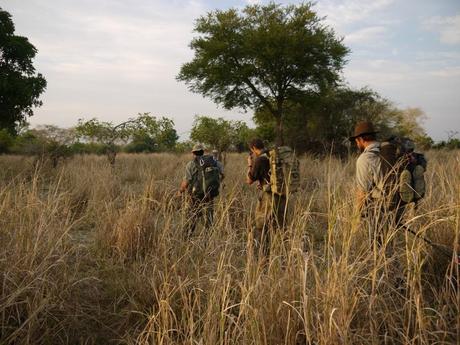
For two weeks at the end of October and beginning of November a team from Secret Compass travelled out to Malawi in southern Africa with a cameraman. We were off to film for an upcoming documentary focusing on bush survival and tracking. Personally this was a fantastic opportunity to build experience of working with film crews in wild and remote places, a steep but enjoyable learning curve. The first half of the expedition involved tracking hyenas, crocodiles and baboons while the second half brought the skills together in a crossing of the Mangochi Forest Reserve and Liwonde National Park. Throughout the expedition various local guides, fixers and experts assisted the team. First up was the hyenas – an animal that most people would opt to avoid, we were going after them. We quickly found large tracks surprisingly close to the local village, deep in the South of Malawi; the local population have had a series of run ins with hyenas with a string of deaths in recent months. Unfortunately the most we were to see of these deadly animals were their tracks – a night of walking and driving across a huge area was to no avail; this clever animal clearly outwitted us this time. Whilst not coming across any hyenas it was a fantastic opportunity to learn more about their behavior. From tracking hyenas on dry land we moved to the Shire River to look for crocodiles. Unfortunately this is best done at night when they can be found using a very high power torch; personally I’d rather watch them in broad day light at a safe distance from dry land; it was not to be. As the youngest and most junior member of the crew I pulled the short straw; I wouldn’t be riding in the fibreglass motorboat, I’d be in the wobbly, not completely water tight, dug out canoe with one of our guides. The fact he was carrying a high powered rifle was reassuring until I was told that if he had to fire it we’d capsize; if we needed to defend ourselves we’d still fall in to the water with the crocodile(s)….fantastic! A long night followed of looking for, and following, crocodiles and learning about their movements and behavior – I was astonished how intelligent and sneaky they could be as well as being in a constant state of fear as our canoe wobbled around the banks. Being up close and personal with this mighty animal was a real privilege; they were mere feat away, staring at you with menacing eyes. Despite the fear, it was a night to remember. Severe weather sadly meant we were restricted to the one night’s stalking. Tracking baboons was a very different experience; following them on foot through thick bush and up steep hillsides was a far more tiring experience but a lot less scary! Baboons are particularly vicious and will certainly fight back if provoked by competitors or humans; it wasn’t just the crocodiles and hyenas that were a threat during the trip. The local population are extremely wary of them and they are classed as a pest in Malawi. Our time spent tracking baboons on the banks of the Shire river was also an excellent opportunity to learn about and practice various fishing methods, both those used locally and back in the UK – we had little success! Following a week of intensive tracking and animal behavior lessons the team would put the information learnt in to practice. Walking through the Mangochi Forest Reserve and Liwonde National Park would take four days and there was every opportunity we’d come across hyenas, crocodiles and baboons, as well as elephants (which we’d learn about on the trek) and a whole host of other wild animals. With the right information and training the threat of these animals to a person moving through their terrain can be greatly minimalised. A qualified doctor carried out an extensive medical lesson before the trek, covering everything from snakebites to sprained ankles. Whilst being for the benefit of the documentary it was also a great opportunity for the team to all learn a little more, in particular the medical knowledge required for the specific environment, in this case the African bush. It was a tough four days in which we covered over 50 miles, the longest day being around 25 miles. With temperatures reaching the mid forties and packs weighing in at 15 to 20 kilograms each we moved across the beautiful Malawian bush. At the end of day one we’d crossed the Mangochi Forest Reserve, climbing up and over a series of big hills through dense bush. Day two wasn’t any easier as we covered 25 miles on the hottest day. Day two was was a real challenge but brought one of the highlights of the trip; encountering the children of a remote village who had never seen white people before – our spirits were lifted as they followed the team singing and dancing. The end of day two saw us enter the Liwonde National Park and over the following two days we trekked from the northern border to the southern, encountering herds of elephants, hippos and crocodiles, to name just a few, on the way. It was a fantastic opportunity to learn about elephant behavior in particular – seeing a local guide talk to an elephant to calm it down was quite an experience! The trek provided some of the most beautiful camping spots around, from beautiful sandy riverbanks to build a fire on to huge baobab trees for neighbours. Just be careful when you go down to the river for a wash with crocodiles and hippos metres away – it certainly made us wash quickly! To be part of an upcoming documentary was incredibly exciting, to have the opportunity to gain the experience and learn a huge amount was a real privilege of the job!
Check out www.secretcompass.com

